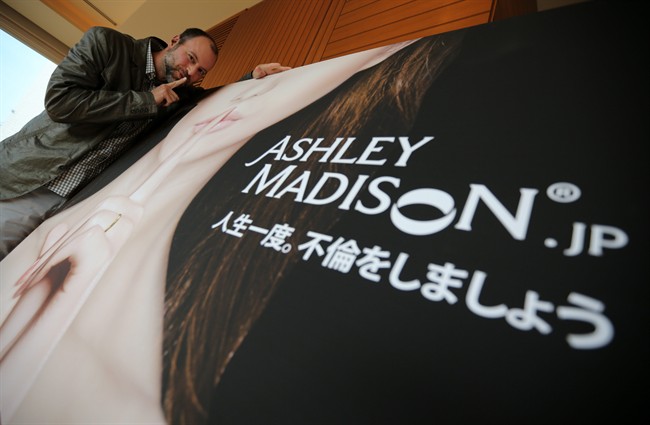TORONTO – A dating website for married people seeking affairs is suing the government of South Korea after being blocked in that country over what it says are false allegations of illegal activity.

Ashley Madison’s Korean site was shut down this spring shortly after its launch, with authorities there alleging it incited immorality, according to media reports at the time. Adultery is illegal in South Korea.
In a statement of claim filed in federal court Wednesday, Ashley Madison denies the accusations, describing itself as “a social networking website facilitating communication between like-minded adults.”
READ MORE: Ashley Madison sues employee claiming she wrote fake sexy profiles
The company accuses the South Korean government of engaging in “uncompetitive acts” by unfairly banning the website while allowing local businesses to operate similar ones.
It alleges the effects of that decision trickle down to Canada, limiting Ashley Madison’s success among Korean-Canadians and other Asian-Canadians and reducing overall competition in the social media market.
“There’s no adultery that happens on Ashley Madison, it’s just a publication,” the company’s CEO and founder, Noel Biderman, told The Canadian Press.
“We write very little, our users write everything. So therefore Facebook would have to be shut down, any place where somebody wrote about, or any phone call anybody made – holding all those devices, all those platforms responsible, that’s where you have to start that conversation.
“You can’t selectively pick us to try to make an example out of us,” he said.
READ MORE: Singapore blocks adultery website Ashley Madison amid public outcry
The Toronto-based company is seeking an unspecified amount for loss of revenue and lost profits, as well as general damages for uncompetitive conduct.
It also wants the court to order South Korea to stop blocking the website.
None of the claims have been proven in court and Korean authorities have yet to file a statement of defence.
Ashley Madison has also been banned in Singapore, but Biderman said the situation in South Korea is different because the site had already been operating for weeks when it was shut down.
The site, which uses the slogan “Life is short. Have an affair,” launched there on April 1, the claim says. It has already expanded to more than 30 countries, it says.
In just over two weeks, the new site drew nearly 50,500 members, the document says.
Soon after, Korea Communications Standards Commission – a government agency also targeted by the suit – blocked the site, alleging that it “contained illegal information,” it reads.
The company says it was never told what the commission’s concerns were, and that its appeal of the decision was dismissed within days “without further explanation.”
READ MORE: The business of cheating has never been better
Ashley Madison says the website “neither contains illegal information, nor does it aid or abet any illegal activity.”
The suit alleges South Korea is trying to give its own companies a leg up when it comes to breaking into the Canadian market.
“The defendants’ anti-competitive practices in South Korea have a direct impact in Canada on communications and social networking businesses and websites competing for the Korean-Canadian and Asian-Canadian market for such websites,” it claims.
“Given the global reach of the Internet, a social networking service that meets with success among any particular group of people in one country has or will have a significant competitive advantage among people of that same group or related groups in other countries.”
Ashley Madison – which filed the suit through its parent company, Avid Life Media – says it will lay out its financial losses during trial, which it suggests be held in Vancouver.



Comments